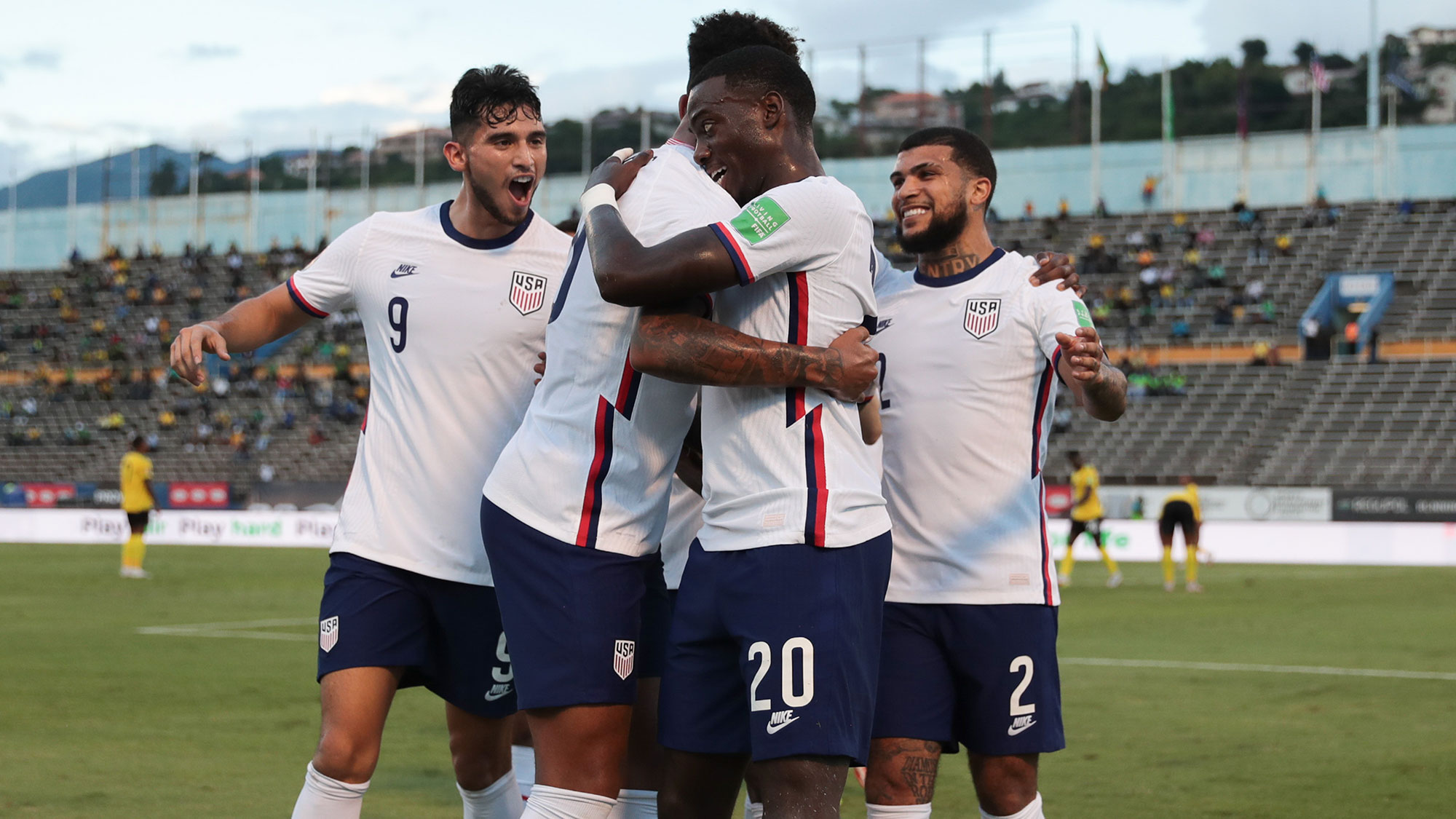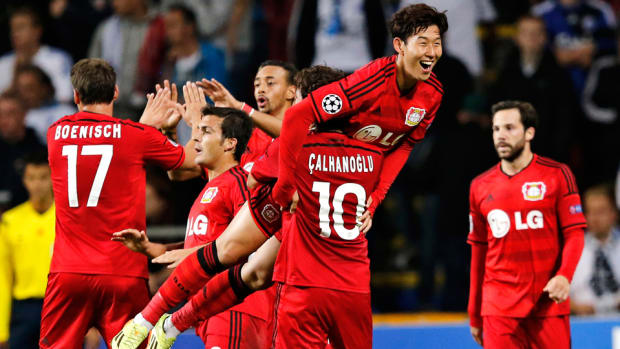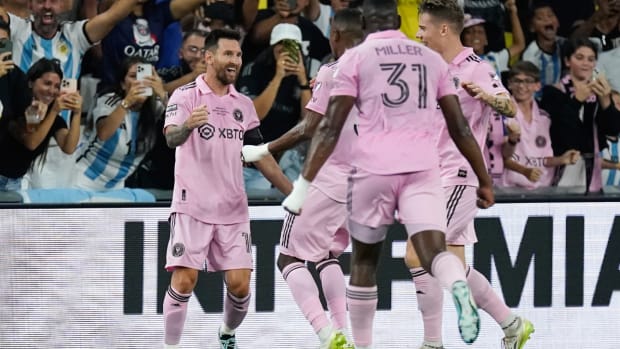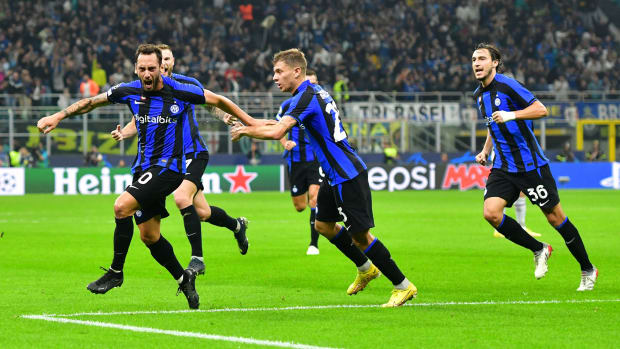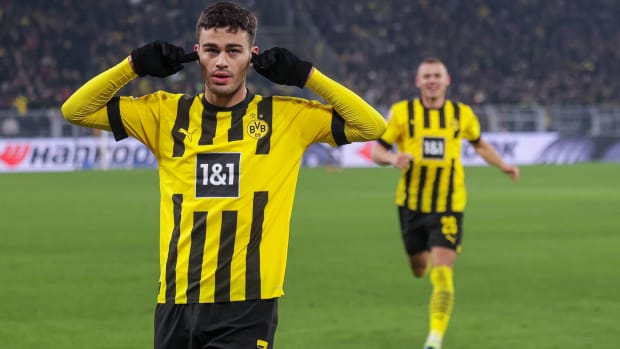The Thump and the Whistle: Decisive Sounds Define USMNT's 'Decent' Draw
KINGSTON, Jamaica — The sound of Michail Antonio’s foot striking the ball had almost the same reverberation—the same sort of visceral thump you can feel surge through your chest—as the beat in the Bob Marley medley that was blasting inside Jamaica’s National Stadium about half an hour earlier.
This is a country that’s defined in part by sound, and so the first match played in front of Jamaican fans since before the pandemic fittingly was as well.
There was the din of the vuvuzelas and air horns carried by the small but enthusiastic crowd of 4,100 here at the venue they call The Office. There was the unmistakable leathery punch you could hear across Independence Park as Antonio, a new Reggae Boy recruit, leveled the score on a stunning, world-class goal that altered Tuesday’s World Cup qualifier. And then there was the whistle that saved it for the U.S. men’s national team, which unexpectedly benefited from a road refereeing decision that fell its way.
The Costa Rican middle man ruled out a potential Jamaican game-winner in the 84th minute, thus preserving a 1-1 draw for the Americans. Perhaps if The Office was filled to its 35,000 capacity, Juan Calderón would’ve been less decisive or sympathetic in that critical moment.
“I don’t think you get that call at times,” said U.S. center back Walker Zimmerman, the player Jamaica’s Damion Lowe was adjudged to have fouled before heading home what would’ve been the backbreaker. “So it’s fortunate.”
But this was an odd game in a slightly surreal setting. Jamaica has been taking the pandemic really seriously. There are signs and billboards around the capital reminding residents to comply with protocols. Entering a hotel, business or bus often required temperature checks and/or a liberal spritz of hand sanitizer, and masks are ubiquitous inside and out. Once Marley’s music ended, the stadium PA was used most frequently to remind fans scattered around the bleachers to keep their masks on and stay six feet apart.
A national curfew of 8 p.m. pushed Tuesday’s kickoff forward to 5 p.m, which feels almost like lunch time in Concacaf. And so the moon rose over the lush green hills sitting just behind the arena as the U.S. and Jamaica contested a scrappy and physical qualifier during which you could hear just about everything—from the shouts of individual supporters to the pivotal plays that’ll shape the road to Qatar.
“It wasn’t really much of a soccer match. It was more just physicality—who could run longer and just continue to fight, and I’m proud of the boys of how they did that,” U.S. goalkeeper Zack Steffen said. “It wasn’t a pretty match and we knew it wasn’t going to be a pretty game going into it. We knew that we needed to fight and that’s exactly what we did. We got a decent result.”
There was some pregame pressure on the Americans to equal the proactive performance they put on last Friday in Cincinnati. There, the U.S. played Mexico off the TQL Stadium stadium pitch in what became an instant “Dos a Cero” classic. Conditions were far different here in the Caribbean, however. Weston McKennie’s suspension and Yunus Musah’s strep throat (he played 65 minutes) impacted the U.S. midfield, the Reggae Boyz were buoyed by having any fans at all and the choppy field lent itself to the direct, long-ball soccer the hosts chose to play. Absent the requisite chemistry and rhythm in midfield, not to mention the turnovers it often creates against teams that try to keep the ball, the U.S. was left to try to limit Antonio and compatriot Leon Bailey and endure the slog.
The draw (and Canada’s subsequent win over Mexico) ensured the U.S. (4-1-3) would conclude the November window in second place in the Concacaf Octagonal, which will send the top three finishers to next year's World Cup and the fourth to an intercontinental playoff. U.S. coach Gregg Berhalter said here that he was happy with that big picture, even if Tuesday’s outcome wasn’t ideal. The lineup he fielded in Kingston was the second youngest in the U.S.'s World Cup qualifying history, averaging under 23 years of age.
“We’re looking at it as a good result. Any time you can get a point away from home it is a good thing in Concacaf qualifying. I want to be very clear by saying that. For the guys to have their heads down because we wanted more is completely natural, but this is a point that we’ll absolutely take on the road,” he said.
“We wanted to end in first or second position this window, and we’re in position to do that. We’re going to do that. So that’s positive. And now we have six games left—two windows [early next year]. And that's where we want to hopefully seal the qualification.”
The Americans looked like they ready to take a big step toward Qatar early Tuesday. They enjoyed the stronger start and took an 11th-minute lead through winger Tim Weah, this month’s U.S. revelation. The son of a Jamaican mother (and a very famous father), Weah lifted the visitors in front with a beautiful run through two defenders and a tight-angled, left-footed finish past goalkeeper Andre Blake.
It was the potential highlight of the night for 10 minutes.
Antonio, 31, is new to the Jamaican national team but he’s an established Premier League star who’s tied for second on the 2021-22 scoring chart. The London-born son of Jamaican parents had harbored hopes of playing for England, but after several close calls, he agreed to represent the Reggae Boyz and finally received his passport in August. Tuesday’s game was just his third appearance.
In the 22nd minute, he picked up the ball in midfield and held off and then turned Tyler Adams before cutting back onto his right foot and unleashing a shot that echoed around the stadium and shook in the air, bedeviling Steffen. Antonio has Premier League class and confidence infused into an imposing tank of a body. He didn’t do much else Tuesday—the U.S. back four was excellent. But his 35-yard sonic boom reset the game.
“Jeez, it was a good one,” Adams said. “Usually when a player cuts in from there, you’re not thinking that he’s going to shoot it. But he didn’t hesitate.”
Steffen said the shot’s movement reminded him of the Jabulani, the controversial 2010 World Cup ball that seemed to have a mind of its own.
“It was coming in fast. It was moving. I’d have to see it again, but I don’t think I really had much of a chance,” Steffen said.
It took the reeling Americans until the second half to rediscover their legs, and Gianluca Busio, McKennie’s replacement, had a promising shot that curled just over the crossbar. But the better chances fell to the hosts. Christian Pulisic’s 66th-minute entry failed to spark the U.S. and as the visitors began to sit deeper, Jamaica earned a corner kick and appeared to take the lead. But as Lowe was racing toward his bench in celebration, Steffen had already taken the free kick and sent the U.S. on the attack. The whistle was quick, both Berhalter and the players said. And while Jamaica didn’t protest much, the lack of VAR in Concacaf qualifying may have helped the Americans.
“It looked like he shoved Walker. I thought it was a good call,” Steffen said.
“I think the ref blew the whistle pretty early,” Zimmerman said. “I think he had his eyes on it from the beginning of the play, thankfully.”
“He called it really early, so it seemed he was pretty confident of the call,” Berhalter added. “He blew the whistle early and that was a relief.”
A quick whistle and a sigh of relief—those are the sounds of a close call and a point on the road. But what you won’t hear from this U.S. contingent is a moan or lament. The perspective following the tie was mostly broad and positive. This team is now familiar with the Concacaf grind, and everyone knows what sort of pitfalls lie on the road to the World Cup. The Americans avoided them, for the most part, in Jamaica. Four points in a two-game window that included a showdown with Mexico, and which was played with a handful of high-profile players missing or injured, is a decent return.
Berhalter will convene separate camps in December and January. There will be a friendly against Bosnia-Herzegovina on Dec. 18, and then qualifying resumes with critical matches against El Salvador, Canada and Honduras Jan. 27-Feb. 2. The top half of the Octagonal standings is air tight, but the U.S. is where it wants to be.
“When you think about the youth of this group, the inexperience of this group in Concacaf qualifying, you know we’re on the right track,” the manager said. “We’re going through a lot here, man, and we’re learning on the fly and the guys have done a good job with that. We’ll take our position right now and focus on 2022.”
More Soccer Coverage from Brian Straus:
